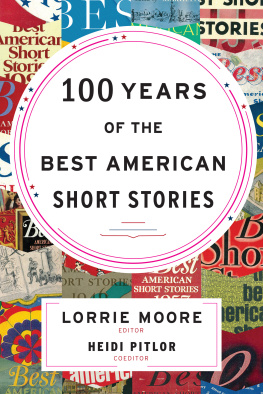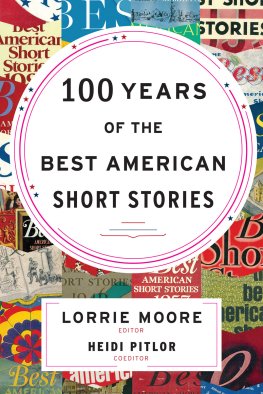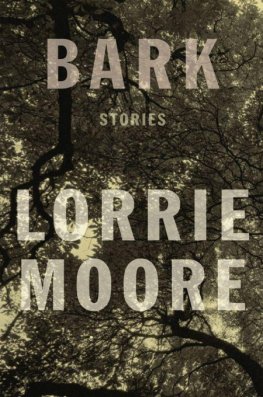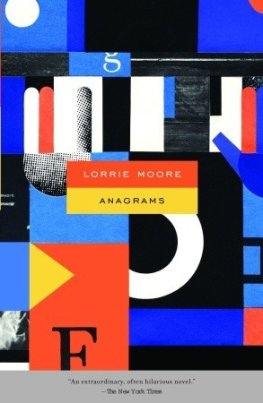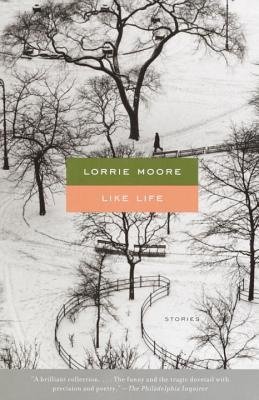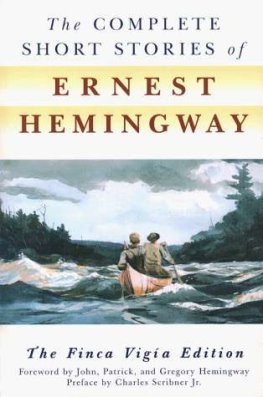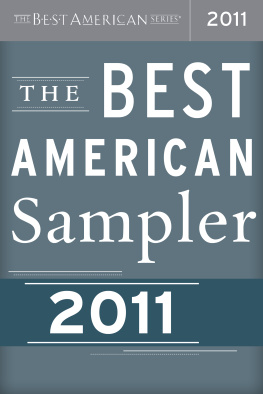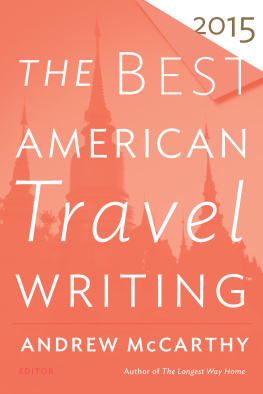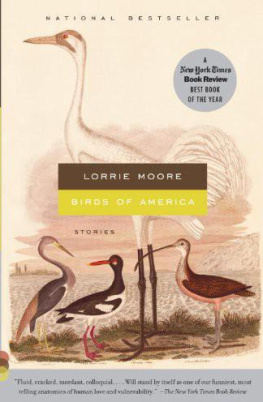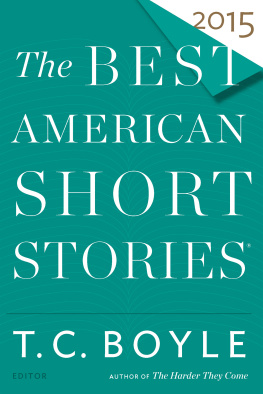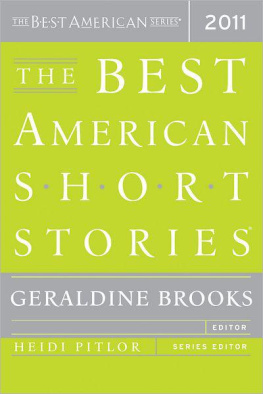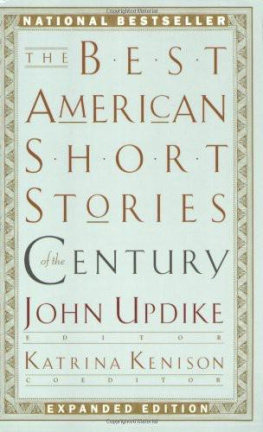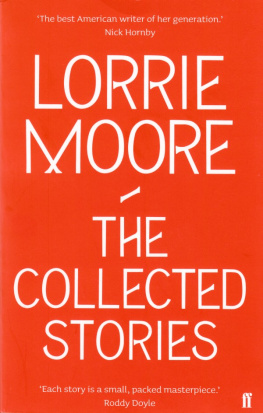Copyright 2015 by Houghton Mifflin Harcourt Publishing Company
Introduction copyright 2015 by Lorrie Moore
Historical introductions copyright 2015 by Heidi Pitlor
ALL RIGHTS RESERVED
The Best American Series and The Best American Short Stories are registered trademarks of Houghton Mifflin Harcourt.
No part of this work may be reproduced or transmitted in any form or by any means, electronic or mechanical, including photocopying and recording, or by any information storage or retrieval system without the proper written permission of the copyright owner unless such copying is expressly permitted by federal copyright law. With the exception of nonprofit transcription in Braille, Houghton Mifflin Harcourt is not authorized to grant permission for further uses of copyrighted selections reprinted in this book without the permission of their owners. Permission must be obtained from the individual copyright owners as identified herein. Address requests for permission to make copies of Houghton Mifflin Harcourt material to Permissions, Houghton Mifflin Harcourt, 215 Park Avenue South, New York, New York 10003.
www.hmhco.com
ISSN 0067-6233
ISBN 978-0-547-48585-0
Cover design by Christopher Moisan
e ISBN 978-0-544-05606-0
v1.1015
What You Pawn I Will Redeem by Sherman Alexie (2004). First published in The New Yorker. From Ten Little Indians by Sherman Alexie. Copyright 2003 by Sherman Alexie. Used by permission of Grove/Atlantic, Inc. Any third party use of this material, outside of this publication, is prohibited.
Brothers by Sherwood Anderson (1921). First published in TheBookman.
Sonnys Blues by James Baldwin (1958). First published in Partisan Review. Collected in Going to Meet the Man by James Baldwin, Vintage Books. Copyright 1957 by James Baldwin. Copyright renewed. Used by arrangement with the James Baldwin Estate.
The School by Donald Barthelme (1975). First published in The New Yorker. Copyright 1974 by Donald Barthelme. Reprinted by permission of The Wylie Agency, LLC.
Harmony of the World by Charles Baxter (1982). First published in Michigan Quarterly Review. From Harmony of the World: Stories by Charles Baxter. Copyright 1984 by Charles Baxter. Used by permission of Vintage Books, an imprint of the Knopf Doubleday Publishing Group, a division of Penguin Random House LLC. All rights reserved. Any third party use of this material, outside of this publication, is prohibited. Interested parties must apply directly to Penguin Random House LLC for permission.
Will You Please Be Quiet, Please? by Raymond Carver (1967). First published in December. From Will You Please Be Quiet, Please? by Raymond Carver. Copyright 1966 by Raymond Carver. Copyright 1989 by Tess Gallagher. Reprinted by permission of The Wylie Agency, LLC.
The Enormous Radio by John Cheever (1948). First published in The New Yorker. From The Stories of John Cheever by John Cheever. Copyright 1978 by John Cheever. Used by permission of Alfred A. Knopf, an imprint of the Knopf Doubleday Publishing Group, a division of Penguin Random House LLC. All rights reserved. Any third party use of this material, outside of publication, is prohibited. Interested parties must apply directly to Penguin Random House LLC for permission.
Fiesta, 1980 by Junot Daz (1997). First published in Story. From Drown by Junot Daz. Copyright 1996 by Junot Daz. Used by permission of Riverhead Books, an imprint of Penguin Group (USA) LLC.
The Conventional Wisdom by Stanley Elkin (1978). First published in American Review. From The Living End by Stanley Elkin. Copyright 1980 by Stanley Elkin. Reprinted by permission of Georges Borchardt, Inc., on behalf of the Estate of Stanley Elkin.
What We Talk About When We Talk About Anne Frank by Nathan Englander (2012). First published in The New Yorker. From What We Talk About When We Talk About Anne Frank: Stories by Nathan Englander. Copyright 2012 by Nathan Englander. Used by permission of Alfred A. Knopf, an imprint of the Knopf Doubleday Publishing Group, a division of Penguin Random House LLC. All rights reserved. Any third party use of this material, outside of this publication, is prohibited. Interested parties must apply directly to Penguin Random House LLC for permission.
That Will Be Fine by William Faulkner (1936). First published in the American Mercury. Copyright 1935 by Penguin Random House LLC. Copyright renewed 1963 by Penguin Random House LLC. From Collected Stories of William Faulkner by William Faulkner. Used by permission of Random House, an imprint and division of Penguin Random House LLC. All rights reserved. Any third party use of this material, outside of this publication, is prohibited. Interested parties must apply directly to Penguin Random House LLC for permission.
The Gay Old Dog by Edna Ferber (1917). First published in MetropolitanMagazine.
Babylon Revisited by F. Scott Fitzgerald (1931). First published in TheSaturday Evening Post. Reprinted with the permission of Scribner, a division of Simon & Schuster, Inc. From Babylon Revisited and Other Stories by F. Scott Fitzgerald. Copyright 1960 by Charles Scribners Sons. Copyright 1920, 1922, 1924, 1925, 1926, 1928, 1931, 1932, 1937 by Charles Scribners Sons. Copyright renewed 1948, 1950, 1952, 1953, 1954, 1956, 1959, 1960, 1965 by Charles Scribners Sons. All rights reserved.
Communist by Richard Ford (1986). First published in Antaeus. From Rock Springs by Richard Ford. Copyright 1987 by Richard Ford. Used by permission of Grove/Atlantic, Inc. Any third party use of this material, outside of this publication, is prohibited.
The Girl on the Plane by Mary Gaitskill (1993). First published in Mirabella. Reprinted with the permission of Simon & Schuster, Inc. From Because They Wanted To by Mary Gaitskill. Copyright 1997 by Mary Gaitskill. All rights reserved.
At the Round Earths Imagined Corners by Lauren Groff (2014). First published in Five Points. Copyright 2013 by Lauren Groff. Reprinted by permission of The Clegg Agency, Inc.
Those Are as Brothers by Nancy Hale (1942). First published in Mademoiselle. Copyright 1941 by Street & Smith Publications, Inc. Reprinted by permission of Harold Ober Associates Incorporated, as agent for the McDowell Colony, Inc.
My Old Man by Ernest Hemingway (1923). Reprinted with the permission of Scribner, a division of Simon & Schuster, Inc. From The Short Stories of Ernest Hemingway by Ernest Hemingway. Copyright 1925 by Charles Scribners Sons. Copyright renewed 1953 by Ernest Hemingway. All rights reserved.
Old Boys, Old Girls by Edward P. Jones (2005). First published in The New Yorker. From All Aunt Hagars Children by Edward P. Jones. Copyright 2006 by Edward P. Jones. Reprinted by permission of HarperCollins Publishers.
Xuela by Jamaica Kincaid (1995). First published in The New Yorker. From The Autobiography of My Mother by Jamaica Kincaid. Copyright 1996 by Jamaica Kincaid. Reprinted by permission of Farrar, Straus and Giroux, LLC.
The Third and Final Continent by Jhumpa Lahiri (2000). First published in The New Yorker. From Interpreter of Maladies by Jhumpa Lahiri. Copyright 1999 by Jhumpa Lahiri. Reprinted by permission of Houghton Mifflin Harcourt Publishing Company. All rights reserved.
Haircut by Ring Lardner (1925). First published in Liberty magazine. Reprinted with the permission of Scribner, a division of Simon & Schuster, Inc. From The Best Short Stories of Ring Lardner by Ring Lardner. Copyright 1926 by Charles Scribners Sons. Copyright renewed 1954 by Ellis A. Lardner. All rights reserved.
Next page
